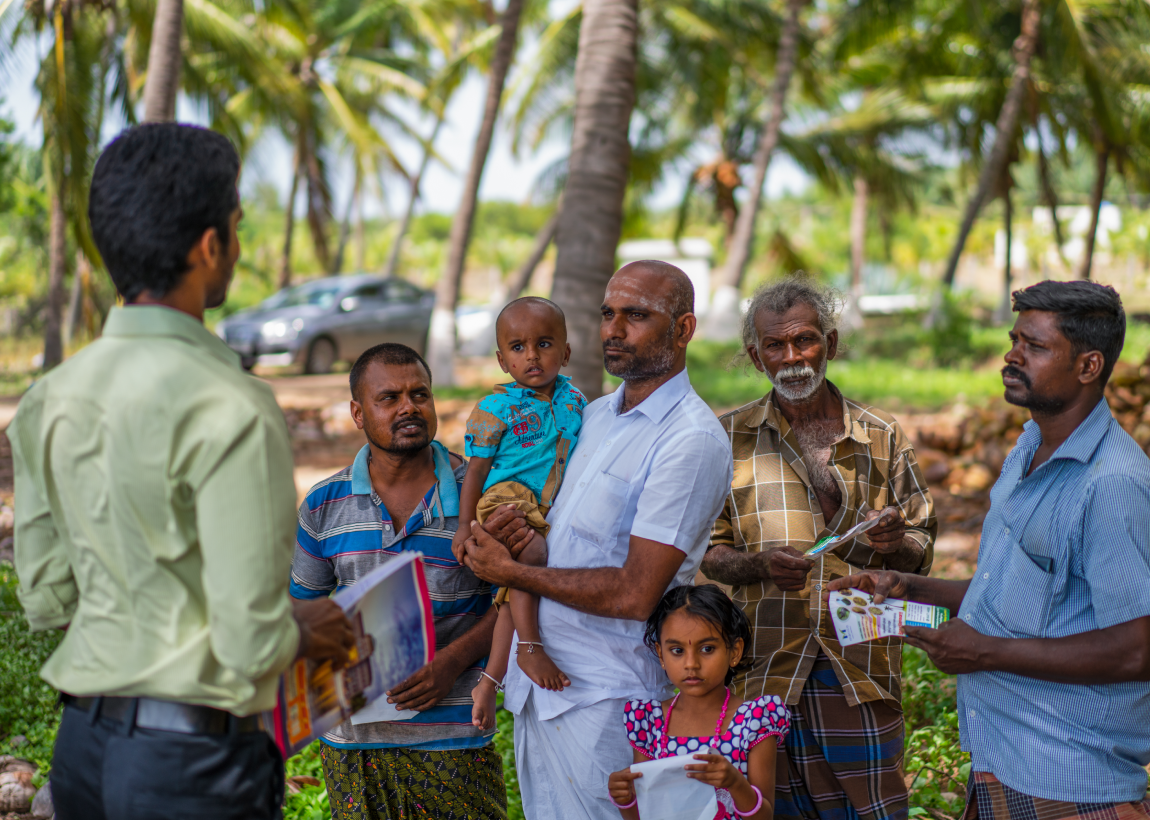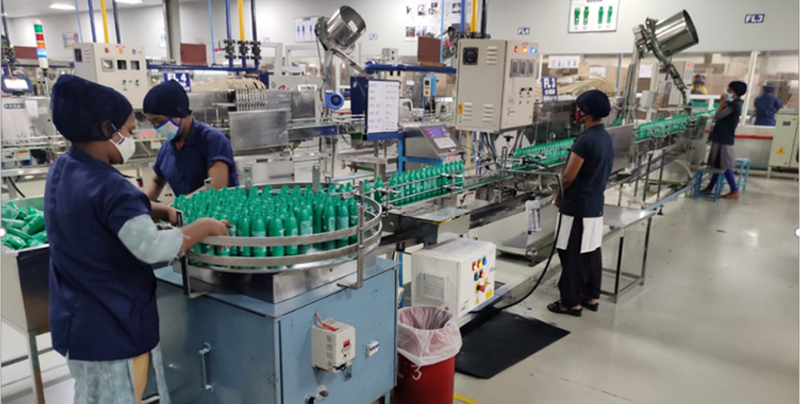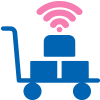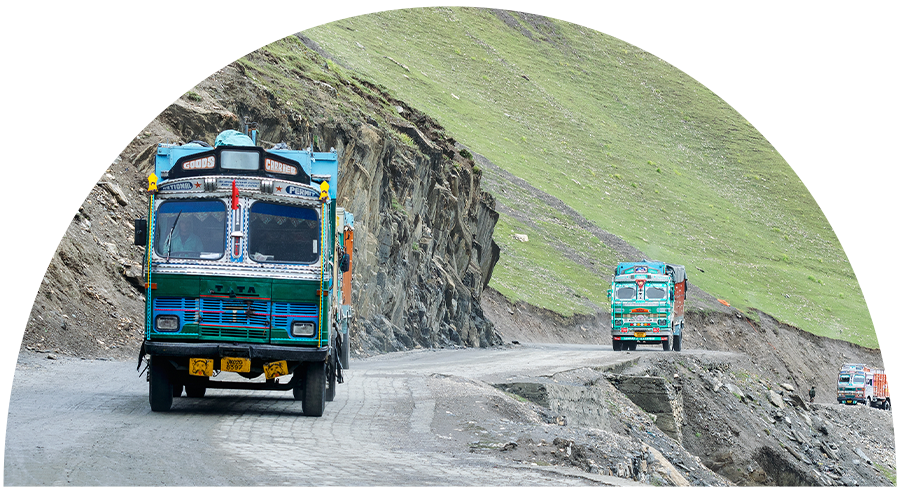VALUE-CHAIN PARTNERS
COLLECTIVE EFFORTS
towards responsible growth
Collaborative association with our value chain partners plays an intrinsic role in attaining mutually beneficial outcomes and steering responsible business practices. We regularly engage with them to understand their modus operandi, business-critical concerns, and expectations from their relationship with Marico.
Throughout our engagements we try to synchronise our vision towards a socially inclusive and sustainable future with the actions that are currently being taken by our partners. Our efforts are maneuvered towards elevating local economy and outspreading positivity in lives of those who are linked with our value chain while maintaining business continuity.

Distribution of Value chain partners/Suppliers
~412
Total suppliers
as of FY22

Responsible Sourcing Practice
We continue to take forward Marico’s responsible sourcing program, Samyut, to educate our value chain partners about our sustainability vision of upholding ethical, social and environmental commitment through strong governance.
Read more on EnvironmentEnsuring ethics and integrity across the value chain
Marico's Code of Business Ethics (MCoBE) encompasses the organisation’s philosophy, vision, policy and actions towards integrating human rights and ethics in every stratum of the business ecosystem.
All value chain partners must adhere to the mandatory guidelines on MCoBE that constitutes a non-negotiable component of every business contract.
The following components of MCoBE ascertain that our partners understand and reciprocate on our value towards protection of business ethics and human rights across the value chain.
- Anti-bribery and corruption
- Human Rights (Child Labour, Forced Labour, Wages, Working conditions)
- Diversity & Inclusion
- Safety, Health and Wellness
- Prevention of Sexual Harassment
- Environmental commitments
Raw Material & Packaging Material Suppliers
Upstream supply chain, especially of raw and packaging materials, prompt production and distribution patterns that tacitly influence consumption behaviour. We prioritise supplier relationship management that operates with the philosophy of creating synergistic business goals and inspire our partners to deliver excellence and efficiency. Some of the important facets of supply chain that we pay special attention to, while maintaining supplier relations are described here.
Supplier Selection Process
The supplier selection process is applicable for procurement of commodities and non-commodities by the organisation. The policy guidelines elucidate the following stages in the standard vendor evaluation process:
Vendor identification: The identification of appropriate vendors is done based on the business needs and is influenced by critical factors like the vendor’s current business share, price, availability of the material etc.
Vendor Evaluation: Scrutinisation of vendors’ competence, credibility, and background verification are performed on the identified vendors considering illustrative parameters such as tenure in business, local credentials, market credibility, production capacity, alignment with Marico’s pre-requisites and mandatory compliance with regulatory requirements (VAT, PAN registration etc.). The vendors are also be assessed on the geographical area of operation.
Vendor Application & Registration: Once the background screening process is completed, the shortlisted vendors are requested to fill Marico’s Vendor Application and Registration form with all relevant details as required.
Vendor audits: Based on the nature of goods procured (commodities or non-commodities), the Consumer Quality audits are conducted based on predefined audit boundaries. The outcomes of these audits help the procurement team to ascertain the technical and financial credibility of the vendor, ahead of the selection process. In other instances, the audits help in periodic tracking of the vendors’ performance on specific requirements.
Vendor Selection: Recommendations from the dedicated Vendor Evaluation (comprising of the Procurement Head, respective procurement managers and commercial experts from buying team) are sought at this stage, to validate credentials provided by the vendor. The final selection of vendors take place on the basis of technical parameters, quality aspects and cost considerations. The absolute must-haves derived from Marico’s responsible sourcing principles (ethical responsibility, environmental conservation and social commitments) are also vetted at this stage, in case the vendor qualifies as a ‘critical vendor’ in the respective category.
Delegation of Authority: All documents submitted by the vendors are scanned and maintained on the Vendor Master Gateway. Based on the size of the business share, the
Supplier Development & Supply Assurance
We embrace the expertise of our diverse suppliers and work closely to align their performance with our broader goals. New vendors are identified from diverse background and are on-boarded after rigorous screening assessment. Capacity Development programs are organised intermittently to resolve quality issues, drive innovation, enhance performance and assure time-bound supply, that in turn, strengthens our long-term relationship and earns competitive advantage.
Quality within Supply Chain
The procurement and central quality assurance team at Marico jointly drives the Supplier Quality Excellence (SQE) program which aims at capacitating our valuechain partners to accelerate performance and deliver excellence.
Supplier Quality Excellence (SQE) @ Marico
Based on, and in line with, recognised schemes of Global Food Safety Initiatives (GFSI), Marico’s ‘Supplier Quality Excellence’ program aims at enabling valuechain partners to ensure that supplied products are safe, legally compliant and conforms to agreed quality specification.
Scope
- Developing supplier capability to deliver zero defect products
- Attaining excellence through benchmarking and continual improvement
- Monitoring system efficiency and effectiveness
- Reducing Cost of Poor Quality (COPQ) and improving supplier profit margins
Outcomes till date
- Reduction of quality incidents in raw materials by 11% and packing materials by 26% from FY21 to FY22 despite multifold increase in volumes and number of SKUs sourced
- Managed to reduce the inventory by norm reduction in selected categories of packing materials by 17%, foods by 10% and raw materials by 6% when compared to FY21
Approach
1 As-is study and
benchmarking
2 Developing comprehensive SQE Handbook
and Audit check sheet with periodic updates
3 Gap Analysis & Capability Building
Supplier Self Audits, Marico Visits and Training Programs
4 Verification & Corrections
Audits, Audit Closure Reports and Data analysis
5 Continuous Improvement
CAPA Insights Document created and shared with all suppliers
as a proactive measure to identify quality issues & their prevention methods
- Managed to bring down COPQ by 24% in packing materials through structural interventions when compared to FY21
- 85% of our suppliers enrolled in the program are placed under premium category of vendors basis performance evaluation
Encouraging local procurement
Sheltering numerous sustainable implications, local/indigenous procurement has reserved our preference. It reinforces flexibility, transparency, and control over supply chain, thereby establishing stability in operations.
As of FY22, 94% of our procurement by spends were from local/indigenous suppliers.
Diversity in PCNO cluster

Packaging support activities of Parachute products,our signature brand, takes place at third party units in and around our Perundurai and Pondicherry units which together forms the Parachute Coconut Oil Cluster (PCNO) including Coimbatore. The PCNO manufacturing cluster provides livelihood generation opportunities to local community, especially women, proclaiming diversity in workforce and inducing economic stability in society. Out of 1,500 employees working in the cluster, around 600 employees are local residents.
40%
of total workforce comprises
of women employees
40%
of total workforce belong
to local communities
Convertors
Our salient ally with convertors or third-party manufacturers ensures uninterrupted operations. They share the responsibility of transforming our products into packaged finished goods, that are ready for dispatch. We assist our business associates in upgrading their facilities to make best quality products with minimum environmental footprint. We also provide on-site assistance to our convertors with respect to technology upgradation, quality management, capability building, process modification, operational excellence and safety, health, and environment (SHE) initiatives.
Our key coconut cluster convertors have FSSC 22000 certification on food safety management. Some of our packaging partners also undergo commercial audits conducted by external agency. In FY22, in addition to external audits and certifications, Marico team has conducted several training and upskilling programs for dedicated third-party manufacturers on machinery maintenance procedures, 7QC tools, food safety, operational SOPs, quality management system and safety procedures as a part of our common development goal.
Some of initiatives undertaken in FY22 to improve operational efficiencies of our filling and packaging associates include:

1 New mold installation for productivity improvement
2 Automation initiatives like online conveyors, auto capping machines
3 Projects on rejection moulding
Depots and Warehouses
Synchronised functioning of our downstream value chain partners, depots and warehouses, facilitate smooth delivery of our products in different regions. We aid their capability elevation journey by means of several engagement programs.
Hyderabad, Sonipat, Coimbatore & Bhiwandi Warehouses
Depots with Warehouse Management System
Automation in Warehouses
Incorporation of ‘Warehouse Management System’ (WMS) in four of our major warehouses has helped us improve operational efficiency and stocks accuracy by automating elementary functions like goods receipt, storage, warehouse control, picking and retrieval of goods.
Logistics and Transportation
Strategic involvement with logistic and transportation throughout planning, execution and monitoring of product movement is crucial for enhancing customer experience while bypassing geographical limitations. Our initiatives with logistics partners are thoughtfully designed to build an agile and sustainable distribution network with wider market coverage at competitive costs.
FY22 initiatives
 Vaccination drive conducted for all depot and ground staffs
Vaccination drive conducted for all depot and ground staffs
 Crisis Management workshop was conducted for leadership team
Crisis Management workshop was conducted for leadership team
 Alternate network planning was undertaken to identify any at-risk lanes
Alternate network planning was undertaken to identify any at-risk lanes
 Expansion of Logistics Process Digitisation project
Expansion of Logistics Process Digitisation project
Occupational Health & Safety systems at Depots and Warehouses
Considering health and safety vulnerabilities in our supply, we have adopted an integrated approach on identifying potential risks and hazards, prevention of hazards and protection of personnel against occupational risks.
~500 man hours
spent in FY22 towards safety trainings to depot staff and contractual workers on themes like fire safety, electrical safety, loading/unloading techniques along with storage/handling, crisis management, Leakage & Damage, Food Safety, DQR & QMS Goods In Transit and waste management.
Zero major incident reported in any of the depots and warehouses. This has been the trend for the last 5 years.

Every manufacturing partner and depot operator is expected to follow health and safety guidelines covered under Samyut Policy and qualify a set of critical SHE criteria to continue their associations with Marico.
SHE trainings are conducted by Marico’s SHE manager for respective depot managers or leads. The same training is then conducted for depot workers by depot managers. Monthly reviews are conducted for depots to check their incident preparedness and proactiveness to mitigate future risks. External agencies are appointed to add an extra layer of due diligence to existing health and safety practices at depots and third party manufacturing units. In FY22, Safety Health and Environment audit was conducted by M/s QACA.
No major health and safety related incident was recorded in FY22